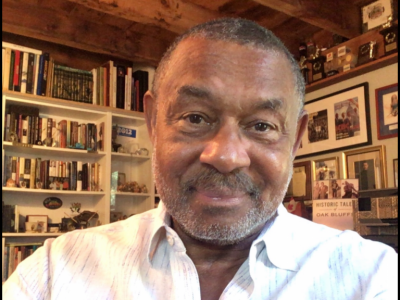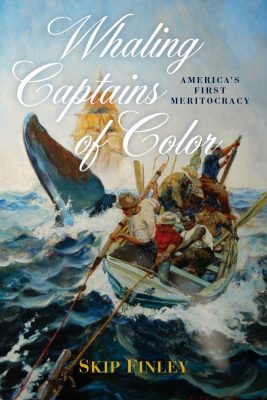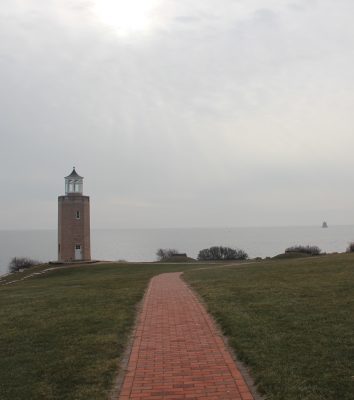
The 25th season of the Coastal Perspectives Lectures will begin at 7:30 p.m. on Feb. 9 with a presentation by author and historian Skip Finley titled, “A Voyage of Discovery with Skip Finley.”
This annual lecture series spans the breadth of human interactions with coastal waters, including speakers from the natural and social sciences as well as arts and humanities. It is sponsored by Connecticut Sea Grant, the UConn Department of Marine Sciences, the UConn Maritime Studies program and the UConn Avery Point Director’s Office.
Author of the recently published book, Whaling Captains of Color – America’s First Meritocracy, Finley will tell the story of how whaling was the first American industry to exhibit any diversity, where a man could rise to the ranks of captain based on skill, not skin color. His book features stories from the lives of over 50 whaling captains of color. Join Skip as he shares some of the stories he uncovered during his ‘voyage of discovery’ and paints a picture of the career paths of whalers.
 The lectures, which are free and open to the public, will take place virtually for spring 2021 at 7:30 p.m. on the second and fourth Tuesdays through April 20. Log-information will be available at: https://marinesciences.uconn.edu/lectures/. Guidance on using WebEx (our online platform) can be found at: JPG.jpg PDF.pdf
The lectures, which are free and open to the public, will take place virtually for spring 2021 at 7:30 p.m. on the second and fourth Tuesdays through April 20. Log-information will be available at: https://marinesciences.uconn.edu/lectures/. Guidance on using WebEx (our online platform) can be found at: JPG.jpg PDF.pdf
If organizers are able to move to in-person lectures, they will be held in the UConn Avery Point Auditorium, 1084 Shennecossett Road, Groton, CT. Please email CoastalPerspectives@uconn.edu if you have questions about accommodations. [campus map.pdf]
For more information or to be added to our email list, send an email to CoastalPerspectives@uconn.edu.
For more information on “A Voyage of Discovery with Skip Finley,” can be found here.
The rest of the series will include:
- Feb. 23, Andrew Kahrl, professor of history and African American Studies, University of Virginia, “The Struggle toReclaim Connecticut’s Coastal Commons.” Kahrl will discuss his book “Free the Beaches: The Story of Ned Coll and the Battle for America’s Most Exclusive Shoreline, which recounts the history of coastal development, beach privatization, and racial segregation in twentieth-century Connecticut and the struggle to restore public access to the state’s shoreline from the 1970s to the present. He will also discuss the social and environmental impact of exclusionarypublic policies on the state’s coastline and its future implications. More information about his presentation can be found here.
- March 9, Chris Bowser, NYSDEC Hudson River Estuary Program and the Hudson River National Estuarine Research Reserve, “The Hudson River

The Avery Point lighthouse looks out over Long Island Sound and Ledge Light at the mouth of the Thames River. Judy Benson / Connecticut Sea Grant Eel Project: Fish Conservation through Community Engagement.” Learn more about the mysterious American eel (glass eel). Bowser will introduce the world of glass eels, touch on the international cultural aspects of eels, as well as dive deep into the community science work characterizing glass eel populations on the Hudson River and how that community science-based data are applied to conservation efforts. More information on his presentation can be found here.
- March 23 and April 6, speakers to be determined. Check back at: https://marinesciences.uconn.edu/lectures/.
- April 20, Margaret Gibson, Connecticut state poet laureate and UConn professor emerita; and David K. Leff, poet, lecturer and former deputy commissioner of CT DEEP, “Rousing the Ecological Imagination through Poetry.” Poetry is a means by which people can deeply connect with the world around them. Ecology is a science of connection. As we rush headlong into the Anthropocene, earth’s complex systems are increasingly lashed to and influenced by human activity. If the delicate balances among the planet’s organisms and habitats are to survive, humanity has to be roused to good stewardship. Poetry’s fresh images and concise, musical language has the voltage to strike that emotional chord supporting science and public policy by rousing consciousness, amplifying compassion. More information about this presentation can be found here.